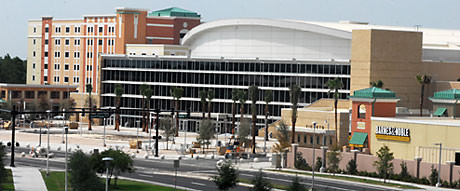SHARE:
Workforce Readiness
Florida's educational system is committed to growing a prepared workforce at every level.
CHOICE Makes a Difference Do career academies work? You bet. Just take a look at Okaloosa County School District in Fort Walton Beach. Since 2001, Okaloosa’s CHOICE Institutes have been helping students make a positive transition from high school to high-paying jobs through career academies that combine rigorous coursework with hands-on, practical skills. The programs offered by CHOICE — that’s short for “Career High-Skill Occupational Initiative for Career Education” — focus on the very industries where qualified workers are needed most. Okaloosa students may currently enroll in one of six career institutes — aerospace, construction technology, creative arts, hospitality, information technology and allied health. Courses (pre-institutes) are also available in automotive service, manufacturing and utilities. Curriculum varies depending on the industry focus — students in construction technology, for example, spend three days a week building real houses — but the end result is the same. In addition to high school diplomas, CHOICE students earn college credits and professional industry certifications, all at the same time and at no additional charge. CHOICE graduates who elect to go on to college already have a head start on their credits; those who head directly for the workforce go armed with the kind of nationally recognized certifications that garner better-paying jobs. A recent study by the University of West Florida’s Haas Center reveals that CHOICE graduates — even those who don’t choose college — can expect to earn at least $298,000 more in their lifetimes than traditional high school graduates. Several school districts throughout Florida have already replicated the CHOICE program for their students. And now, thanks to a $1-million grant from Workforce Florida Inc., to establish the “Employ Florida Banner Center for Career Academies,” the Okaloosa County School District will soon be assisting many more. The new center’s mission is to create standards for all of Florida’s career academies and to serve as a resource for school districts seeking to re-engineer their career and technical education programs to better meet the workforce demands of high-growth industries in their communities. |
Community College Clout
Since the first Florida community college — Palm Beach Junior College — opened its doors in 1933, community colleges have been a driving force in Florida’s career and technical education effort. Whether preparing young people for further education or direct entry into the workforce, or retraining adults to assume new jobs in such fast-growing industry sectors as information technology and life sciences, the 28 community colleges that make up Florida’s Community College System today play an increasingly vital role in workforce preparation.More than 900,000 students are served annually by Florida’s community colleges at 61 campuses and 171 sites. The majority (63%) are part-time students, with an average age of 25, who fit classes in between work and family responsibilities. Full-time enrollment tops 320,000.
Florida community colleges offer close to 800 associate in arts and associate in science degrees and some 500 certificate programs; several even offer four-year degrees. While some students use the credits acquired at a community college as an interim step toward earning a bachelor’s degree at a four-year college or university, many more seek skills and technical training for direct workforce application. Florida’s community colleges awarded a total of 66,341 degrees/certificates in 2005-2006.
Public and Private Higher Education
At 11 public universities, dozens of private colleges and universities and hundreds of technical institutions, Florida’s workforce of the future is busy today acquiring the knowledge and skills that will be needed tomorrow.
 Renovated and expanded in 2007, the University of Central Florida (UCF) Arena is the focal point for a new athletic village. [Photo: University of Central Florida] |
Enrollment at Florida’s public universities tops 280,000; another 120,000 students attend private, independent colleges and universities in Florida. In 2006, public universities in Florida awarded more than 64,000 degrees. The state boasts four major medical schools; a fifth at the University of Central Florida in Orlando is working its way through the accreditation process with plans to open in 2009.
The Independent Colleges and Universities of Florida (ICUF) is an association of 28 private, accredited and not-for-profit schools that are Florida-based. With classes at more than 180 sites throughout the state, ICUF schools turn out one-third of all college degrees awarded in Florida, including 26% of baccalaureate degrees and 56% of first professional degrees (doctors, lawyers, dentists, pharmacists, optometrists and podiatrists).
Additional educational options are available at career schools and nonpublic colleges, many of which are affiliated with the Florida Association of Postsecondary Schools and Colleges.







 Business Beat - Week of May 3rd
Business Beat - Week of May 3rd


